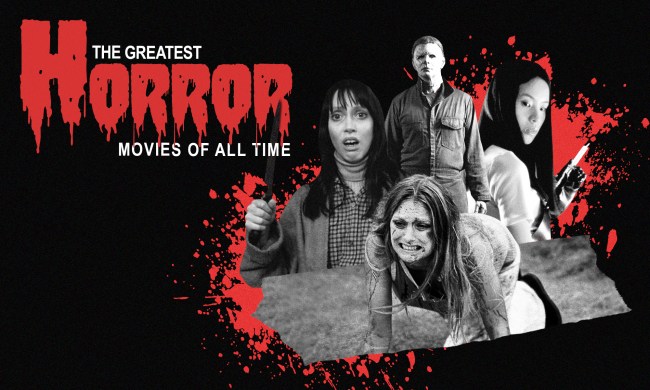- cross-posted to:
- horrormovies@lemm.ee
- cross-posted to:
- horrormovies@lemm.ee
"In Wes Craven’s “Scream” — not quite the definitive horror movie but certainly the definitive account of horror fandom — final girl Sidney famously responds to the question of whether she likes scary movies with a resounding no. “What’s the point? They’re all the same,” she says through the phone to the movie’s slasher. “Some stupid killer stalking some big-breasted girl who can’t act who is always running up the stairs when she should be running out the front door.”
Her complaint acts as a clever joke about the stale state of the mainstream slasher genre that Craven was riffing on (and unintentionally revived) through his tongue-in-cheek meta spin. But it’s also a nod toward the less-than-flattering viewpoint that gatekeepers and non-horror aficionados have toward the genre, as a playground for cheap and easy B-movies and formulaic jump scares.
In Wes Craven’s “Scream” — not quite the definitive horror movie but certainly the definitive account of horror fandom — final girl Sidney famously responds to the question of whether she likes scary movies with a resounding no. “What’s the point? They’re all the same,” she says through the phone to the movie’s slasher. “Some stupid killer stalking some big-breasted girl who can’t act who is always running up the stairs when she should be running out the front door.”
Her complaint acts as a clever joke about the stale state of the mainstream slasher genre that Craven was riffing on (and unintentionally revived) through his tongue-in-cheek meta spin. But it’s also a nod toward the less-than-flattering viewpoint that gatekeepers and non-horror aficionados have toward the genre, as a playground for cheap and easy B-movies and formulaic jump scares. Related Stories ‘Separated,’ a documentary by Errol Morris Errol Morris’ Hard-Hitting Documentary ‘Separated’ Should Be Released Before the November Election HAPPY DEATH DAY, Jessica Rothe, 2017. ph: Patti Perret. ©Universal Studios/courtesy Everett Collection Blumhouse Brings Screams to Theaters with AMC’s BlumFest
Anyone who dives into the history of horror will know that that’s certainly not the case. Rooted in silent cinema classics like “The Cabinet of Dr. Caligari” and “The Phantom Carriage,” the horror genre encompasses campy creature features, exploitative shock fests, cerebral psychological terror, vomit-inducing flesh-and-spine-bursting Cronenberg creations, mournful ghost stories, modern “elevated horror,” and a dozen other microcategories beyond films about a stalker with a knife and a grudge. And that’s not to discount the slasher films that offer something rivetingly new and original.
What makes a horror film a part of the genre thus has relatively little to do with its actual content and everything to do with what it provokes within its audience. Making a truly scary movie — one that burrows into your mind and delivers a sense of unease that can’t be forgotten — is a task that requires much more skill behind the camera than it is often given credit for, and the best horror movies have a craft to them that stands up to any auteur project or Oscar Best Picture winner. It’s no surprise that the genre has such a passionate, devoted following of film geeks that regularly turn out for new releases — when a horror movie is great, there’s no experience quite like it.
In building IndieWire’s new list of the greatest horror movies ever made, we opted to omit some films that straddle the nebulous line between the horror and thriller genres (so you won’t find “The Silence of the Lambs” here, to get a particularly major example out of the way), at least for now. We paid attention to films that paved the way for the genre and for filmmaking as a whole, as well as to modern classics that bring something new and brilliant to the canon today. What every film on this list has in common is that their horrors are more than just boogeymen and spirits projected upon a silver screen, but a conduit into which deeper real-life fears are made manifest. From social discontent to primal fear of the unknown, horror is a genre that reflects on humanity’s most potent paranoia, and the eternal darkness that rests within us. Read on for our list of the 75 greatest horror movies ever made…"
No “the descent” I’m not a subscriber to this list. One of the greatest horror movies.
Agreed. That movie still gets me.
Rewatched it recently and as they keep getting deeper and deeper and more cut off, it just continues to be tense.
One of the greatest story boarded movies to ever be written, I can’t believe how much it builds on itself. It was set up amazingly. I don’t get to recommend it to nearly as many people as I’d like, because eff it’s scary, but I’m not a big horror movie fan and it’s one that I recommend with surprising frequency.
Anyone who hasn’t seen it and is reading a thread about horror movies, go watch this one, and then join us in complaining when it’s left off a "greatest horror movies"list
@Donjuanme @TheColonel amen!
This list is bananarama. I mean most of them are pretty weirdly subjective, but this one is especially wacky.
“A Girl Walks Home Alone At Night” is a pretentious art film that mostly based on its production gets lauded, but it is still a boring exposition of beautiful b&w cinematography and nothing else.
Not a horror movie, less a greatest one.
We paid attention to films that paved the way for the genre and for filmmaking as a whole, as well as to modern classics that bring something new and brilliant to the canon today.
Right there is the end of my interest. As soon as it starts being about what someone considers important rather than actually great, it’s a list for history and not for utility or sharing what’s good in the present. I really wish people looking for quality and greatness weren’t always getting directed to historical footnotes, and nostalgia.






